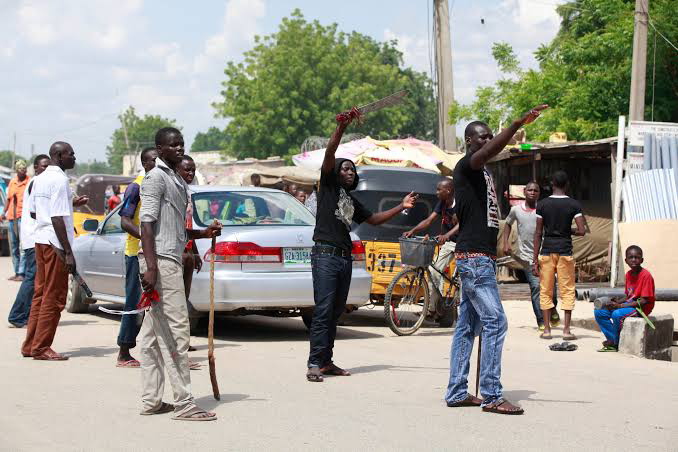One Year After Maiduguri Flood, Survivors Still Struggling to Rebuild
BY: ALBAWABA
MAIDUGURI, Nigeria, Sept 10th — One year after devastating floods swept through Maiduguri, survivors say they are still struggling to rebuild their lives, complaining that aid has been too little and slow, as experts warn the city risks even worse disasters without urgent action.
“When the flood came, everything we owned was destroyed. We had no place to sleep, no food to eat, and my children cried every night,” said Maryam Jidda, a 75-year-old mother of nine, her voice breaking with emotion. “We were only saved by the mercy of God and the kindness of neighbors who gave us temporary shelter.”
Maryam, who once managed in her modest two-bedroom apartment, now squats in a neighbor’s room and relies on others for food.
Maryam’s life has been marked by hardship. She fled Boko Haram’s assault on her hometown Damboa in 2014 and resettled in Maiduguri, where her son gave her a modest two-bedroom house and his wife provided for her daily needs. But after her son’s death, she said life became unbearably harsh.
Then in 2024, another tragedy struck. Floodwaters submerged her home in Gwange III ward, washing away the few belongings she had left.
“The disaster left us with hunger, sickness and no basic necessities,” she said. “We still need help. I want my children to go back to school and live a better life.”
Families Uprooted
Maryam is not alone. A’isha Ali Adamu, 45, a mother of eight, said her life has been a struggle since her husband passed away, leaving her without any means of livelihood.
“For years I managed to survive with my children, but when the flood came, my house was submerged,” she said. “We narrowly escaped death — all of us — as the water swept through our home in Gwange, opposite Zarah Plaza.”
Like Maryam, A’isha now depends on occasional help from neighbors and charity groups. Her children have been out of school since the disaster.
Yusuf Muhammad, 44, a vulcanizer, is also yet to recover. The father of 14, with two wives, said his three-bedroom house was destroyed in the September 2024 flood, along with property worth millions of naira.
“I only received ₦100,000 from the World Food Programme and another ₦100,000 from the Borno State Government,” Yusuf explained. “The money was spent on feeding my family. I couldn’t even start rebuilding my house.”
Limited Aid, Lingering Hardship
The 2024 Maiduguri flood displaced thousands of households and destroyed homes, schools, markets and businesses. Officials distributed food packages, mats and temporary shelter in the aftermath. Relief groups, including the Red Cross and state emergency services, also intervened.
But for many victims, the assistance was a drop in the ocean.
“We received small bags of rice and maize, but it was not enough for a large family like mine,” said Bulama Ali Gana, a father of ten from Budum area. “After a few weeks, we were left on our own.”
Community leaders accuse the authorities of focusing on emergency handouts while neglecting long-term solutions. Many displaced families are still living in makeshift shelters or squeezed into relatives’ homes.
Officials Respond
The Zonal Coordinator of the National Emergency Management Agency (NEMA) in Borno State, Siraj Garba, said last year’s flood was one of the worst in recent memory, displacing thousands of families across Maiduguri.
He explained that NEMA, in collaboration with state authorities, provided immediate relief in the form of food supplies, mats and temporary shelters.
Garba added that preventive measures are now being taken to reduce future risks. “We have intensified awareness campaigns, cleared some blocked drainages, and advised residents to avoid building along waterways,” he said. “The government is also working with partners to improve early warning systems so that communities can prepare before disasters strike.”
Climate Risks
The National Meteorological Agency (NiMET) reported rainfall levels nearly 43 percent above the annual average in Maiduguri last year. The city’s clogged drainage systems and poorly planned settlements could not cope with the excess water, leading to widespread flooding.
“With climate change, the unpredictability of rainfall is a serious concern,” said Prof. Abubakar Kawu Monguno, a geographer at the University of Maiduguri. “Unless the city improves its urban planning and drainage, it will face even worse floods in the coming years.”
He warn that climate change is intensifying extreme weather events across Nigeria, from prolonged droughts in the Sahel to devastating floods in the south. Maiduguri, already strained by over a decade of conflict and mass displacement, is especially vulnerable.
Lives on Hold
For survivors like Maryam, A’isha and Yusuf, the flood’s impact goes far beyond physical destruction. Many have lost livelihoods, with small businesses destroyed and farms ruined. Schools in affected areas were shut for weeks, leaving children behind in their studies.
“I pray for a better life for them,” Maryam said softly. “We have suffered enough.”
As another rainy season sets in, the fear of renewed flooding looms large over Maiduguri’s residents — a city already battered by conflict, poverty and fragile infrastructure. For many families, survival has become a cycle of endurance, hope and uncertainty.



Comments
Post a Comment